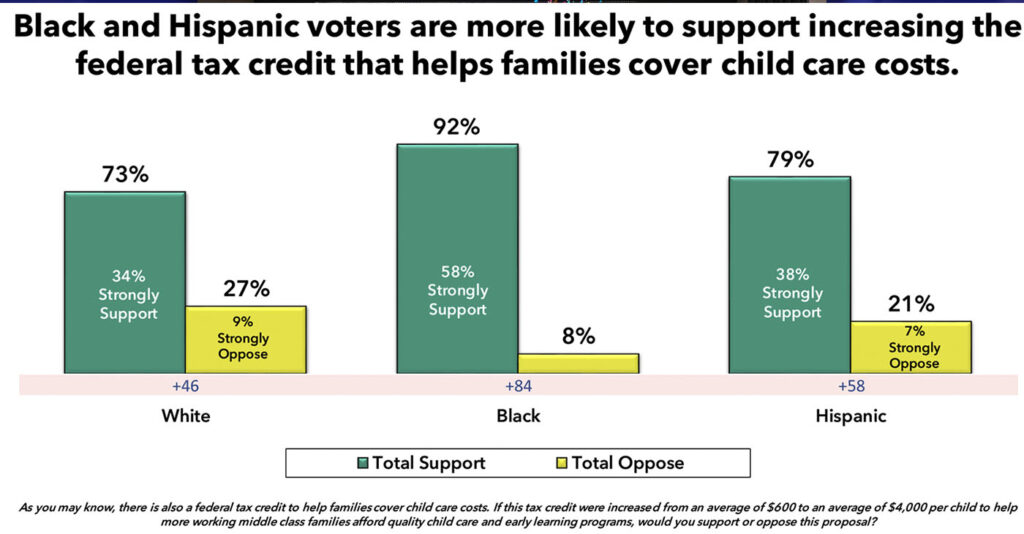A new poll conducted on behalf of First Five Years Fund by the bipartisan research team of New Bridge Strategies (R) and Hart Research (D) found that, in this election year, voters by overwhelming margins want candidates to have a plan to address child care challenges in the United States. The poll finds that 89% agree; 80% of Republicans, 88% of Independents, and 99% of Democrats feel this way.
There’s dedicated support from Black voters for funding to make it happen:
• They were asked, “Do you think that federal funding for quality early education from birth to age five—including childcare and preschool—should be increased, decreased, or kept about the same as it is today?” A majority (71%) of Black voters support an increase; this is the highest percentage of all groups surveyed. Overall, 56% of all voters support an increase.
• They also were asked, “There is also a federal tax credit to help families cover childcare costs. If this tax credit were increased from an average of $600 to an average of $4,000 per child to help more working middle-class families afford quality childcare and early learning programs, would you support or oppose this proposal?” The poll found 92% of Black voters said “yes.” Overall, a large majority of voters (76%) support increasing the federal childcare tax credit.
• Ninety-six percent of Black voters support expanding federal support for childcare. They were asked if they support the following: “Congress would provide more funding to states to expand their existing childcare programs so that lower-income and middle-income families who work or go to school could affordably send their child to a quality childcare, early learning or pre-kindergarten program of their choice. The amount that parents would pay would be based on their household income, with the lowest-income families paying low or no cost.”

Voters across the political spectrum make a strong connection between childcare and a strong economy, with 68% saying access to high-quality, affordable childcare is “essential” or “very important” to strengthening the economy. There’s also dedicated support (84%) for expanding federal tax credits to employers to encourage them to provide childcare benefits; this percentage is the same nationally as it is for the swing states.
FFYF says voters are concerned about the impacts a lack of access to affordable, quality childcare can have on children’s education and development as well as families’ economic prospects. Top messages in support of increasing federal funding for childcare and early learning include giving children a solid foundation, reducing financial strain on families paying for childcare, addressing low wages for childcare workers, and overcoming the limits placed on parents in the workplace when they cannot find quality, affordable care.
Sarah Rittling, FFYF’s executive director, says, “This poll clearly demonstrates that not only do voters want Congress to do more to address childcare challenges today, but they also want future lawmakers to have a plan for addressing childcare challenges tomorrow.
Actions like improving childcare credits and increasing federal childcare funding for states are incredibly popular. Current lawmakers and candidates on the campaign trail have the opportunity now to leverage this clear bipartisan support to bring much-needed assistance to working families with young children.”




